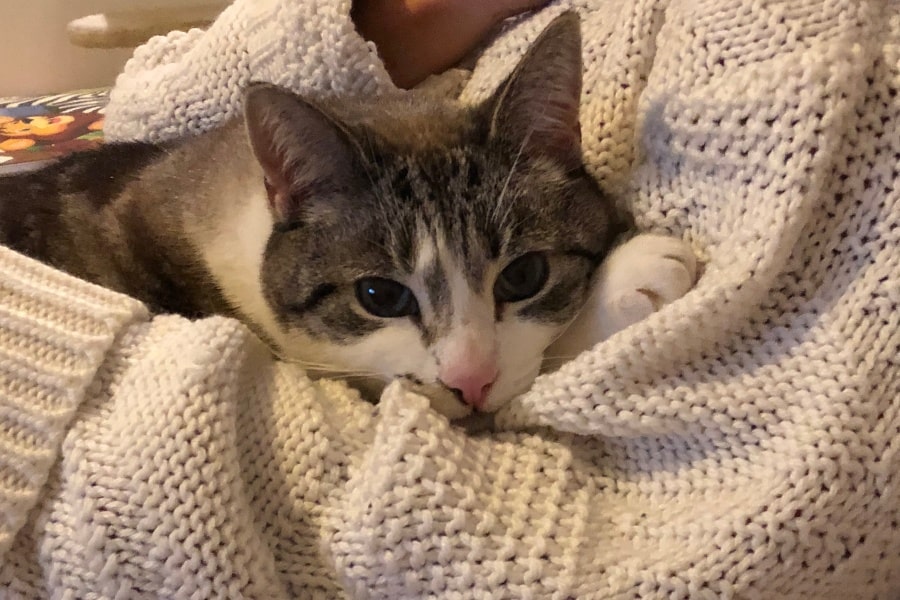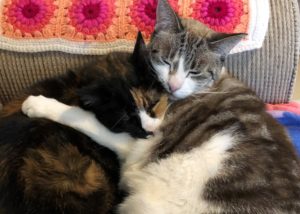It’s winter here in Australia, and our senior cat Sophie (who I introduced in this earlier blog post –> Meet Miss Soph! Introducing The Cat Behind The Blog Category) is getting even cuddlier and more clingy than usual with the changing weather conditions outdoors.
The other day I asked my veterinarian aunt: What special considerations and requirements did our senior cat Miss Soph and other cats have during winter?
While I expected her to have a long list about nutrition and diet, environment, vet check-ups and all that jazz, she said simply that the main things were just warmth, company and food.
So these three simple essentials are really the foundation of cat care during winter and colder months, whether your cats are senior, adults, or kittens.
Disclaimer: I am not a veterinary anything (nurse, surgeon, tech etc.) so this is not to be taken as professional veterinary advice and is for educational purposes only.
Let’s take a look at these essentials one by one.
Warmth – keeping your senior cat cosy
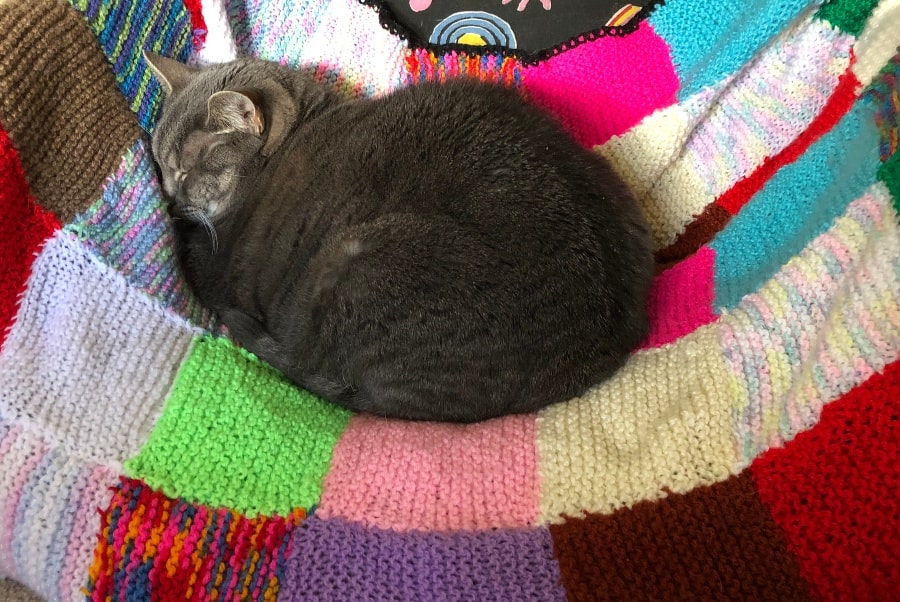
Senior cat Sylvie snoozing on a knitted blanket
I love to knit. When I was basically borderline agoraphobic, I decided to get into knitting for charity. Knitting was soothing, especially as I focused on knitting baby things, animal things, and blankets – my favourite things to knit. Unfortunately, when I finished a blanket, it would more often than not be covered in various shades of cat fur (Sophie’s white coarse fur mainly, but when her tortie sister Pippi was still with us, there was definitely a combination of light Birman fur and multi-coloured tortie fur woven in).
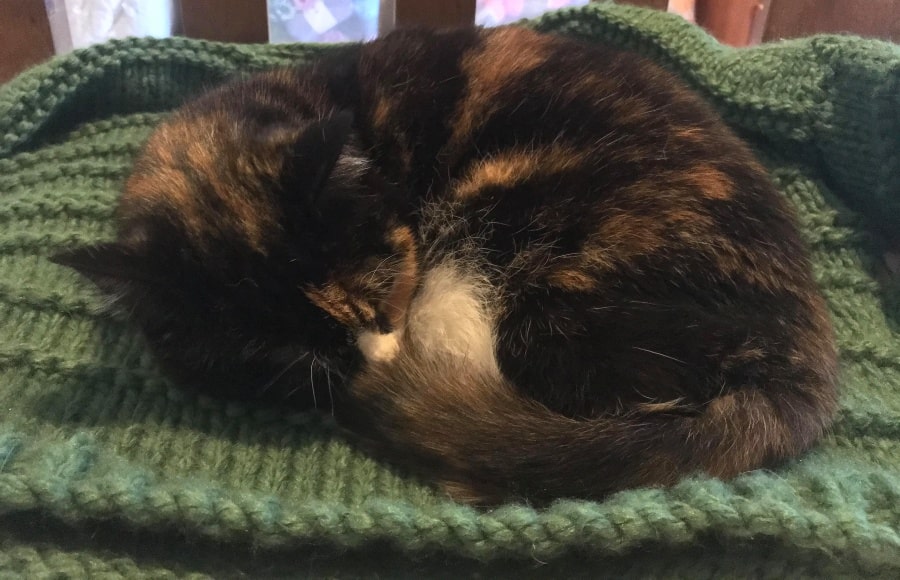
Our sweet little Pippi who passed away in 2020.
While I was knitting blankets, believe me I tried to keep the cats and their fur off the goods. But sometimes I just admitted defeat, finished up the blanket, and put it somewhere they could enjoy it and get some warmth from it.
As well as heaps of knitted blankets (and other items) around in strategic locations, I have other bought blankets and cat beds around the place; I have one permanently set up by the window at the front of the house that gets the warm afternoon sun.
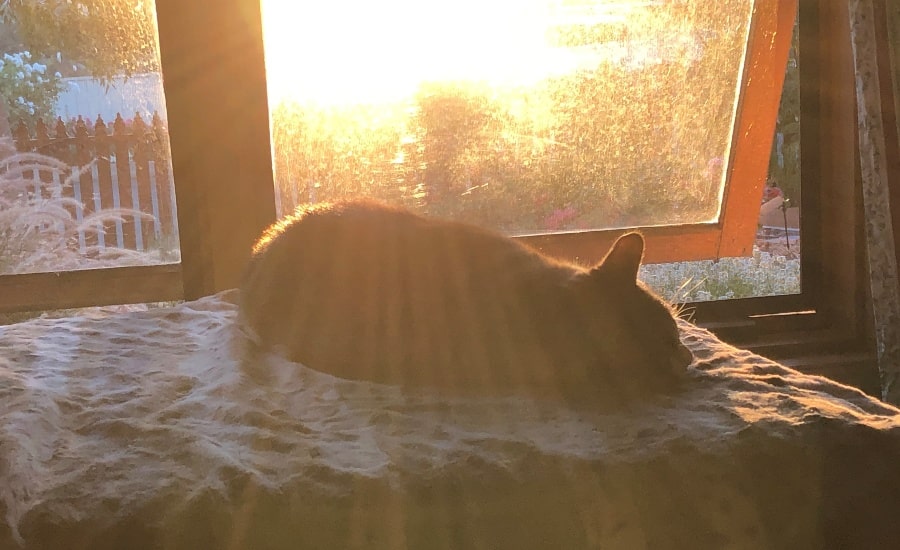
With Sophie being thirteen at the time of writing this, I’ve noticed that there’s a bit more of a pronounced clickety clicking in her joints as she walks, especially in colder weather. Because of this, and the fact that her back legs have always had some problems, we make sure that we put things low down where there’s minimal jumping involved for most of her comfy spots.
Of course being a cat she likes to be high up and survey her domain, seeing her territory as vertical rather than how we as humans see territory as horizontal, so we accommodate for that as well.
We keep things warm and cosy for her, and for us, and make sure she has plenty of places to curl up comfortably.
A lap, any lap, is Sophie’s preferred place to curl up though. She also likes to sleep under the covers with me at night, or curl up somewhere on me during the winter nights (and summer nights – minimal boundaries and no space with this one). At the time of writing this she’s sleeping on me snoring her head off. Cats will be cats.
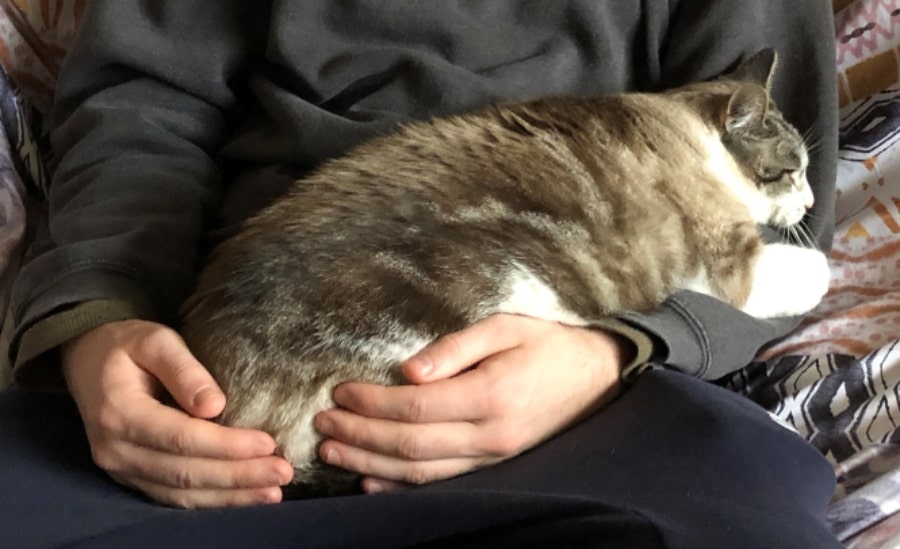
Company – keeping your senior cat happy
Any people who perpetuate this idea about cats being solitary aloof creatures have clearly never met our Miss Soph. I mean yes there are cats out there who are naturally solitary and aloof, just as there are people like that, but not all cats are like this.
Sophie likes company, any sort of company of those she knows well and trusts. I’ve mentioned a couple of times before how she’s clingy and needy and sits on any lap available (or bustles in so that the lap that may have been occupied with a book or laptop becomes available for her). She’s always been like this, and it’s just her unique nature. When Pippi passed away a year and a half ago, all our household went through a period of grieving, and Sophie started vocalising more. Especially out in the backyard.
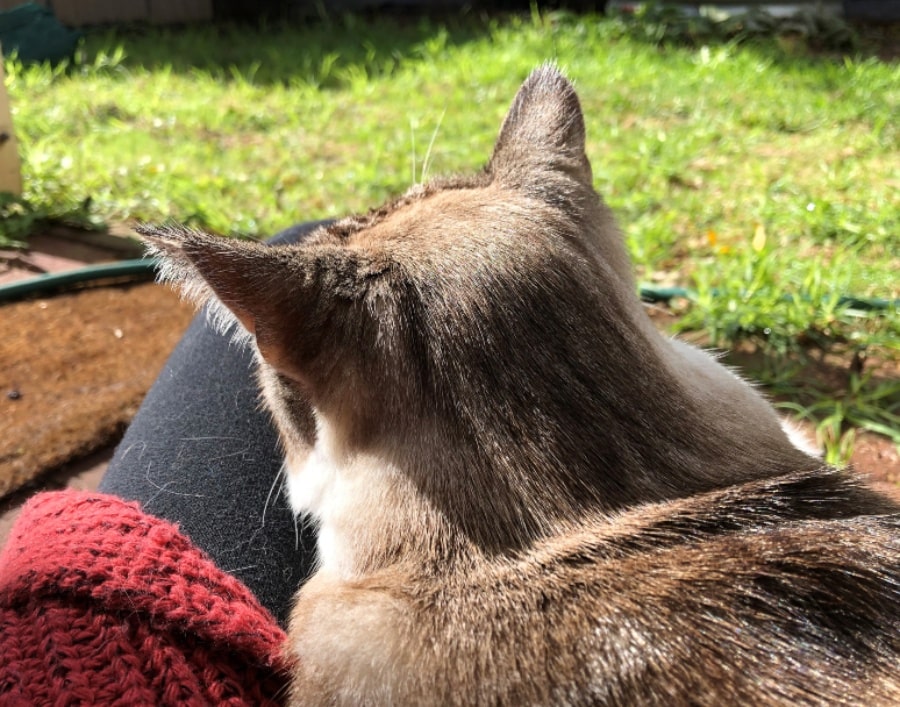
Talking to the neighbour about our vocal cat and how she’d just lost her sister and lifetime companion, our neighbour assumed we’d be getting another cat to keep her company. When I told her that we would not be getting another cat to keep Sophie company, our neighbour looked just about ready to call the RSPCA, and indicated how lonely Sophie must be etc. etc.
What I think people in our society need to get their heads around (here we go, my inner introvert’s getting rankled) is that just because someone is on their own, especially living on their own, it doesn’t necessarily mean that they’re lonely and need another being to assuage that. I got this a lot as well when I lived on my own and everyone seemed to think that I needed a housemate and I must be lonely. Little did they know I was thriving living alone, being alone doesn’t equal lonely (there’s a difference), and that I personally don’t thrive in people company (animal and nature company though, hell yes).
Okay, rant over, but the point is that Sophie is happy enough as things are, and there’s a chance that getting another cat may tip Sophie over the edge of her already fragile and nervy disposition (with a history of nervous gut issues just like her adoptive mama). That’s not a risk I’m willing to take with our thirteen year old cat. Or with the cat that may come into our household.
Miss Soph is happy being the centre of attention in our household, is content with the people company of myself, my partner, and family who she knows that come to visit, and is certainly not lonely.
I’ve told our neighbour that she’s always been very vocal, and she just likes calling out to the world and calling out to us to sit outside with her – or to tell us that she’d like brushings.
Company in winter is especially important for Sophie; she likes her quality time with us and our warmth, sometimes brushings, and sometimes playing. Yes, senior cats still like their play time.
Quality time in winter includes play, and Sophie particularly likes chasing after ribbons attached to a stick, throwing and running around with her little toy mice, playing soccer with a rolled up foil ball, and I don’t know how old this is and it’s severely bite-marked, but a green plastic drinking straw that she swipes around (I think it’s lost under the fridge at the minute).
Play for her is just as important as relaxation and sleepy time. As long as it’s quality time with us, she’s happy.
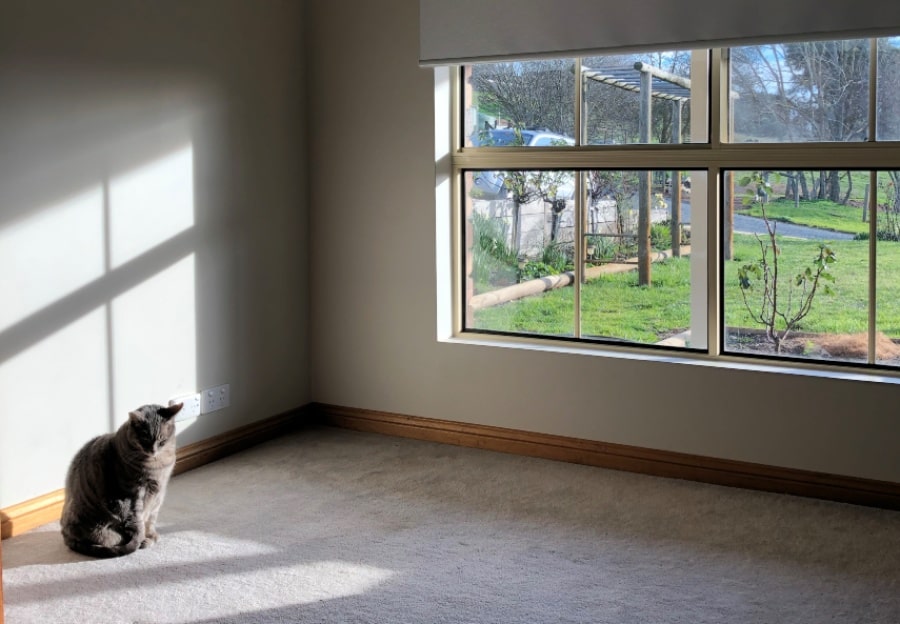
Sylvie enjoying the afternoon sun after a busy morning sleeping and playing.
Food – keeping your senior cat healthy and hydrated
With all that playing and singing in the backyard, our senior cat needs her nutrition and to stay hydrated.
We have multiple water sources around the place (we used to have a water bowl by her food but realised she never drank out of it so decided to put it elsewhere, then found out that that’s a normal cat behaviour for them not to drink water near their food), in most rooms or areas of the house for easy access.
Sophie’s dietary requirements have changed over time, and now we have a good food and nutrition plan that suits her delicate guts and a good routine. It’s the same thing every day, but according to the professionals, that’s fine.
She’s a big foodie who loves her food as much as her humans (maybe more if I’m honest). Miss Soph is a happy cat during winter and other seasons of the year with her food, company and warmth.
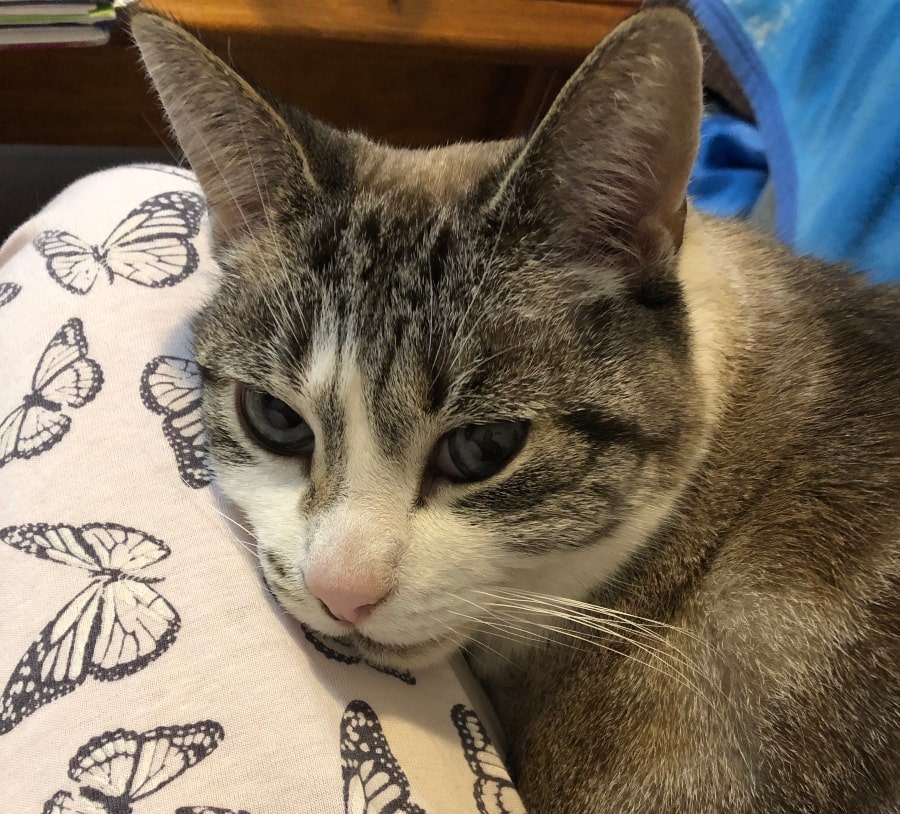
Question Time!
Tell me about your senior cat or cats! How do they go in the winter? Are they cuddly and wanting attention and warmth or do they prefer to go off on their own to snooze in a cosy spot? What do you do to keep them warm and happy during colder months?
I’d love to hear your quiet thoughts as always!
Comment below or reach out to me at [email protected] to let me know.
Keep warm!

P.S. For extra content, updates and other good stuff, feel free to join The Quiet and Curious folk community by signing up to the email newsletter below:

